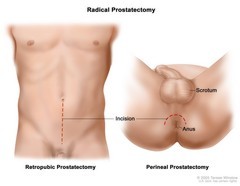- You are here:
- Home »
- Blog »
- Uncategorized »
- Stage 2 PCa- Leaking bladder…anal bleeding…none of this was appealing to me
Stage 2 PCa- Leaking bladder…anal bleeding…none of this was appealing to me

“The decision to go with active surveillance or watchful waiting (after PCa diagnosis) is a personal one…because treatments such as surgery, radiation, or chemotherapy can be rough on your body.”
The doctor proceeded to let me know that I had early stage prostate cancer, stage II.
The doctor proceeded to tell me I had three options:
- wait and see
- surgical removal of the cancer (prostatectomy)
- radiological removal.
I informed them that we would take the wait and see approach.
I was informed that it was suggested that I take the next three months to consider one of the approaches and that in three months get another PSA.
Needless to say I left the office feeling a little overwhelmed. My father had prostate cancer. He first, very early in development, decided to immediately undergo a surgical prostatectomy. This supposedly rid him of the cancer, but it caused urological issues; inability to have an erection and a leaking bladder.
A few years later, having the cancer come back, he underwent radiological procedure brachytherapy. This resulted in periods of anal bleeding and surgical intervention to stop them. None of this was appealing to me…
Michael Thompson
- Prostate Cancer Survivor
- PeopleBeatingCancer Board Director
Recommended Reading:
- Take Prostate Cancer Active Surveillance a step Further
- The Better Prostate Cancer Diet- Mediterranean or Flexitarian?
- Prostate Cancer Diagnosis- Treatment vs. Quality of Life- You Choose…
stage II prostate cancer
What to Expect from Stage 2 Prostate Cancer
“What is stage 2 prostate cancer?
Prostate cancer is cancer that starts in the prostate gland. It can spread outside the prostate into nearby tissue, or through the lymph or blood systems.
The stage of the cancer can be determined with the help of:
- imaging tests
- prostate-specific antigen (PSA) levels
- Gleason score (2–10)
Prostate Cancer: When Treatment Can Wait
“Prostate cancer can grow very slowly. In some men, it can grow so slowly they may never need treatment. But doctors still want to keep an eye on the cancer so they can take action if it gets worse. This approach is known as active surveillance or watchful waiting.
- Your age
- Other health conditions you have, such as heart disease, diabetes, stroke, or other cancer
- Risks and side effects of treatment
- Your tumor is small
- You don’t have symptoms
Some doctors say “active surveillance” or “watchful waiting” to mean the same thing — tracking the cancer and how it may or may not grow. Others think these terms are slightly different. If your doctor talks with you about either term, ask them exactly what they mean by it.
Active Surveillance
With this method, your doctor will use regular tests to check your disease. You’ll have a doctor’s appointment usually about every 3 to 6 months…
Risks of Treatment
The decision to go with active surveillance or watchful waiting is a personal one. But your doctor will discuss these options with you, because treatments such as surgery, radiation, or chemotherapy can be rough on your body. In some cases, the risks and side effects of these treatments are greater than the benefits of killing the cancer. Impotence and urinary incontinence are two such side effects.
Scientists also are still debating whether options such as surgery or radiation always help men with slow-growing prostate cancer actually live longer. Depending on how old you are and if you have other health conditions, you might decide that treatment isn’t worth the risks.
What to expect from prostate cancer surgery
“Not every man who has prostate cancer will receive surgery. Surgery can lead to a range of side effects, such as erectile dysfunction and problems with urinary control, which can affect a person’s quality of life…
Complementary and Alternative Medicines in Prostate Cancer: From Bench to Bedside?
“Complementary and alternative medicine (CAM) use is common among adults, and recent reports suggest that 25%–50% of prostate cancer (PCa) patients use at least one CAM modality.
The most common CAM modalities used by PCa patients are vitamin and herbal preparations with purported antitumor effects despite only modest underlying preclinical or clinical evidence of efficacy.
In this review we provide a brief overview of the basic scientific and clinical studies underlying the most common herbal and vitamin preparations including
- common antioxidants,
- pomegranate extract,
- green tea, turmeric,
- resveratrol,
- silibinin,
- and herbal combination preparations.
When available, prostate cancer clinical trial data are reviewed. Importantly, we have compared the concentration of these agents used in in vitro experiments to that likely to be achievable in humans. From the available data we conclude that there is insufficient evidence to support the use of CAMs for the treatment of prostate cancer patients outside of a clinical trial.
The purpose of this review is to more rigorously evaluate CAM therapy in prostate cancer and educate oncologists and patients. This review focuses on examples from the general classes of agents in common use…”


